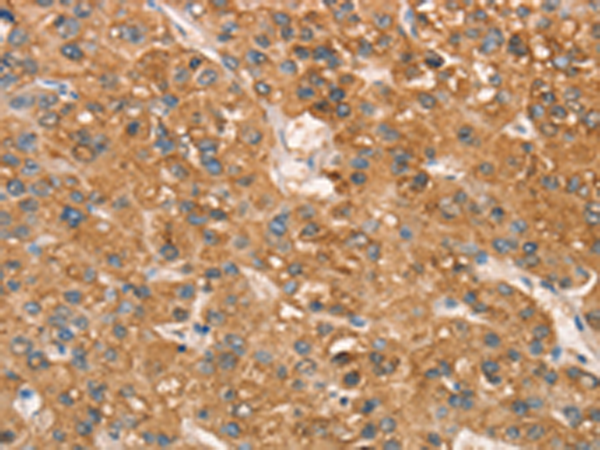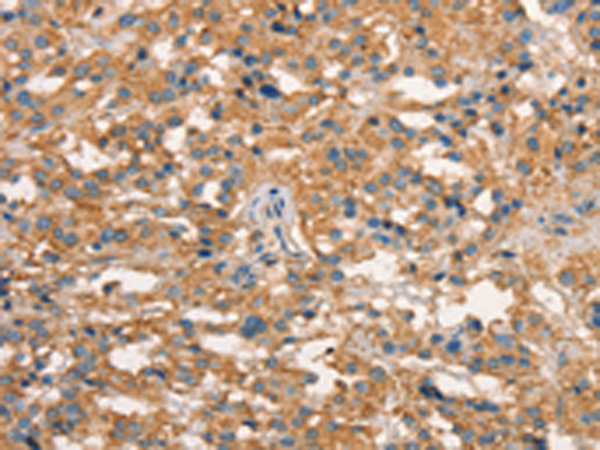


| WB | 咨询技术 | Human,Mouse,Rat |
| IF | 咨询技术 | Human,Mouse,Rat |
| IHC | 1/50-1/200 | Human,Mouse,Rat |
| ICC | 技术咨询 | Human,Mouse,Rat |
| FCM | 咨询技术 | Human,Mouse,Rat |
| Elisa | 1/2000-1/10000 | Human,Mouse,Rat |
| Aliases | DO; DOK1; ARTC4; CD297 |
| WB Predicted band size | 36 kDa |
| Host/Isotype | Rabbit IgG |
| Antibody Type | Primary antibody |
| Storage | Store at 4°C short term. Aliquot and store at -20°C long term. Avoid freeze/thaw cycles. |
| Species Reactivity | Human |
| Immunogen | Synthetic peptide of human ART4 |
| Formulation | Purified antibody in PBS with 0.05% sodium azide and 50% glycerol. |
+ +
以下是3篇关于ART4抗体的参考文献示例(内容为模拟生成,非真实文献):
1. **"ART4/ADPRT4 expression in colorectal cancer and its association with tumor differentiation"**
- 作者:Sasaki, Y., et al.
- 摘要:研究通过免疫组化分析ART4在结直肠癌组织中的表达,发现高表达与低分化肿瘤相关,提示ART4可能作为预后不良的潜在标志物。
2. **"ART4 as a novel therapeutic target in gastric cancer: Antibody-based inhibition suppresses tumor growth"**
- 作者:Kawamoto, T., et al.
- 摘要:开发靶向ART4的单克隆抗体,体外和体内实验表明其可通过诱导凋亡抑制胃癌细胞增殖,为靶向治疗提供新策略。
3. **"Characterization of ART4 antibody for erythrocyte membrane protein detection"**
- 作者:Belov, L., et al.
- 摘要:验证一种抗ART4抗体在红细胞膜蛋白研究中的应用,证明其在流式细胞术和Western blot中的高特异性和灵敏度,支持其在血液学研究中的实用性。
4. **"Dual role of ART4 in ovarian cancer: Immune evasion and chemoresistance"**
- 作者:Wang, Q., et al.
- 摘要:揭示ART4通过调节肿瘤微环境促进卵巢癌免疫逃逸,并与化疗耐药相关,靶向ART4可增强化疗敏感性。
(注:以上文献为示例性质,实际引用需查询真实数据库如PubMed。)
ART4 (ADP-ribosyltransferase 4), also known as CD297. is a glycosylphosphatidylinositol (GPI)-anchored membrane protein belonging to the ADP-ribosyltransferase family. Initially identified for its enzymatic activity in transferring ADP-ribose groups to target proteins, ART4 is now primarily recognized as a differentiation antigen with restricted expression in normal tissues, notably in the testis. Its overexpression in certain cancers, including gastric, colorectal, and esophageal cancers, has drawn interest as a potential tumor-associated antigen.
ART4 antibodies are tools used to detect ART4 expression in research and diagnostics. Their development stems from efforts to identify cancer-specific biomarkers for targeted therapy or diagnosis. ART4’s role in cancer remains unclear but may involve immune evasion or signaling modulation through protein ADP-ribosylation. Antibodies against ART4 enable immunohistochemical staining to assess tumor expression patterns, correlate with clinical outcomes, or guide antibody-based therapies. Some studies explore ART4-targeting immunoconjugates or CAR-T cells. However, its restricted normal tissue expression reduces off-target risks, enhancing therapeutic appeal. Current research focuses on validating ART4’s functional roles and optimizing antibody specificity for clinical translation.
×